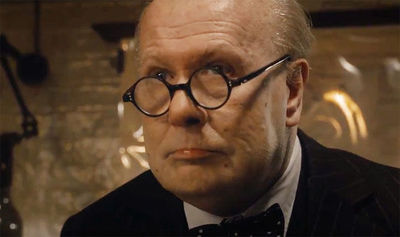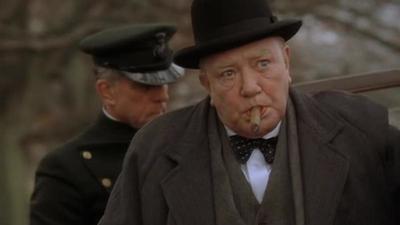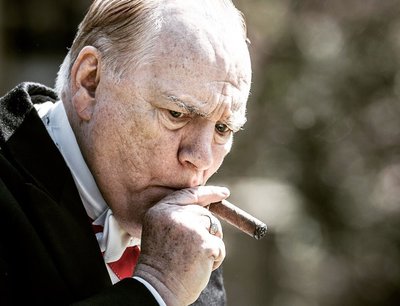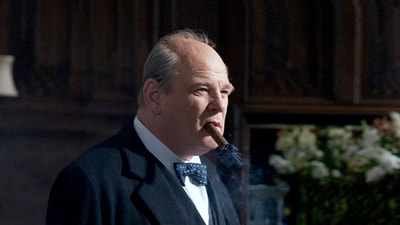Will The Real Mr. Churchill Please Stand Up?
February 2018
Oh dear, it seems the topsy turvy world of Cinema is at it again, doing its best to salvage what it can of conventional World War Two historiography in the face of a public increasingly inured to its nonsense. Having failed in recent times, via Hollywood, to save the wreck of the Holocaust fraud in the minds of discerning members of the public, it has now apparently retreated, with a spate of films in 2017, to what it undoubtedly feels to be safer ground, namely, Winston Churchill and the British war effort.
The film, "Darkest Hour" (presumably not a reference to the time spent watching it), is the latest cinematic version of the British war-time PM, revised no doubt to suit the political sensibilities of those responsible for it, at least in so far as they feel they can presently get away with it. What that means practically is that history will be faked to reflect politically correct or expedient notions of Reality and Mr. Churchill will be presented as heroic only in so far as he can be depicted as opposed to ideologies that the film makers and their like find threatening, even today. Which perhaps explains why they are now so busy overdoing it.
So it comes as little surprise to hear that in the latest offering the role of Mr. Churchill's young, female secretary has been ridiculously exaggerated, a brother of same at Dunkirk has been simply invented, and a scene in an underground train carriage has been completely concocted (one wonders how many cinema-goers will realize any of this). The latter scene is crucial because it is the means by which we are expected to believe that Churchill, of Gallipoli and Dardanelles fiasco, was much concerned about the people he was committing to five more years of a ghastly and immensely destructive war. Or that same people were, for mostly ideological reasons, unanimously or even largely in support of it.
Actually the sad truth is that the real Churchill was much too preoccupied half the time with his own financial calamities, afflicted by his own crippling and compromising vices and beholden and grateful to those who supported and indulged him regardless (for their own purposes) to give much thought to the fate of the ordinary people of the then British Empire, most of whom were seriously misled about the true reasons for the Second World War, and in particular, the necessity of continuing it beyond the Summer of 1940.
I think it safe to say that neither it nor any of the latest, tawdry offerings from the Ministry of Propaganda's department of film and television will be covering the copious, secret funding of Churchill's political career and extravagant lifestyle by foreign special interest groups such as the American Jewish Congress, the Board of Deputies of British Jews and the pre-war Czech government no less.
The present writer has not seen the aforementioned film, and has no intention of doing so, but I think it safe to say that neither it nor any of the latest, tawdry offerings from the Ministry of Propaganda's department of film and television will be covering the copious, secret funding of Churchill's political career and extravagant lifestyle by foreign special interest groups such as the American Jewish Congress, the Board of Deputies of British Jews and the pre-war Czech government no less. Neither will they be touching upon the critical financial bail-out of Churchill in 1938 by a super-wealthy, Jewish emigrant banker called Strakosch, or the personal guarantee by same of Churchill's substantial investments thenceforth. Obviously this kind of support, to the tune of millions of pounds in today's currency (over a hundred million in the case of the Czechs), was not without consideration. Please understand, this is not mere conjecture or politics, it is archival fact, as we shall see.
Therefore, in the interests of furnishing readers with what cannot fail to be a less politicised account of the subject than the recent cinematic efforts, we include below a presentation (video and transcript) of about the same length as a feature film, based not on suitably adjusted present day propaganda requirements, sophisticated audience manipulation techniques and clever acting, but on the bare facts, as collected and presented by the first port of call for serious researchers of the era, British historian, David Irving.
Described aptly by one independent reviewer as "the most damning indictment of Churchill I have ever witnessed", the said presentation was given by Irving circa 1986 to a Canadian audience. It is both edifying and entertaining at the same time, despite the indifferent sound quality in places. Even those inclined to be prejudiced against Irving for one reason or another cannot fail, if they are honest, to be impressed by the sheer scope of the man's knowledge base down to the smallest details and minutiae. Equally impressive are his impeccable and uncompromising research methods, and his insistence on accuracy over personal profit or convenience. What stark contrast to Churchill himself, and his would-be cinematic chroniclers!
It is worth keeping in mind that Irving delivered this talk years before the antics of politicians like Tony Blair and associated, elusive weapons of mass destruction, made the possibility of political leaders selling out their countrymen for profit and political expedience a not so incredible notion in the minds of the British public; the same Blair, by the way, who is now working behind the scenes with the usual tribe of soulless and essentially nationless financial backers and cronies to ensure that Britain remains little more than a vassal state in the EUSSR for as long as possible.
It stands to reason, after all, that the same breed of scoundrels who masterminded the enslavement of Christian Russia for most of last century (and the entire east of Europe for a large part of it) to an atheistic, inhuman and murderous ideology, should now be engaged in a similar venture in the west. Unfortunately however, for "useful idiots" like Blair or his present day equivalent Corbyn, or the utterly craven and duplicitous marionette May for that matter, the better part of the British people, with or without their so-called leaders, are on to them. And not a moment too soon ....
Irving is the consummate historian, a man whose works will be remembered and referred to long after the cinematic contrivances of a degenerate film and television industry are forgotten. Of course he has paid a very high personal price for his insistence on telling the truth, particularly regarding the Holocaust fraud, which has led to him toning down some of his public statements in that regard in recent times, but these concessions will ultimately be seen in light of the context in which they were made and will not detract significantly from any lasting assessment of his outstanding contribution.
We include with the video below an abridged transcript of the talk, in which Irving describes with characteristic frankness and wit Churchill's idea of leading bravely from the front in the face of adversity. Even if one is not inclined to agree with all of Irving's conclusions about the facts he presents, or his world-view, it is impossible for anyone with the least aspiration to impartiality to ignore the raw facts themselves, which are quite damning enough.
What force or guile could not subdue,
Thro' many warlike ages,
Is wrought now by a coward few,
For hireling traitor's wages.
Robert Burns
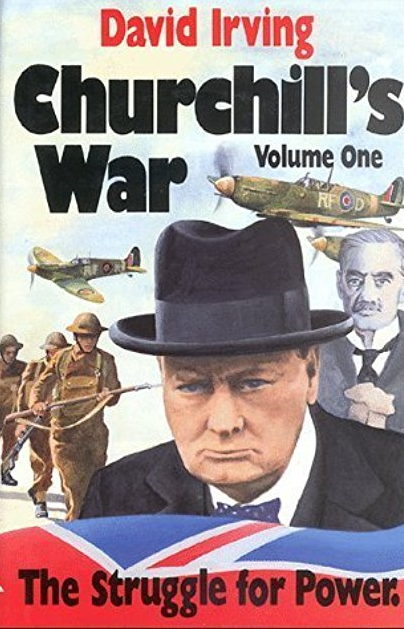 |
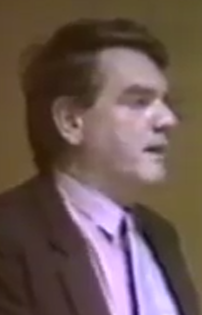 |
David Irving: Churchill's War Presentation; Toronto, Canada c.1986. Video & Transcript (abridged) Book available direct from publisher here (vol.1) and here (vol.2). In pdf here and here. The present writer's addenda to the transcript is in blue text. |
I must say that from what I have seen of this British Empire tour, the white man, and the British in particular have no reason to hang their head in shame. We have done magnificent things over the last two or three hundred years and I'm very, very proud of what we have done. So no way what I am saying this evening can possibly be regarded as anti-British in any sense. What I'm trying to do is to detract from a central part of the British legend, namely Winston Churchill himself, and the war he fought, and whether it was a true and a just war.
|
A bodyguard of lies |
|
You see, when you fight a war you do use lies. Churchill was the biggest liar. It's rather like a flywheel begins to spin. It's set in motion by the propaganda ministerium, by the propaganda officials, whatever they're called. In England they were called the Political Warfare Executive, PWE, some of our most important subsequent politicians like Richard Crossman were leading figures in PWE, and they set out the lies that persuade the soldiers that the war is worth fighting. And they create the war aims for the soldier.
We British, we never had war aims of course, we went into the war ostensibly because of Poland, but by 1939, by the end of that year of course, that war aim had completely vanished. Poland had gone up the spout, or down the tubes, whichever way you care to look at it, and invaded from the east by the Russians, from the west by the Germans, Poland, as such, had ceased to exist. By the Spring of 1940 really the war had no further point.(3)
And yet we find that at the same time now in the German papers, the secret German records of the time, and also pale reflections, pale echoes in the British papers, we find that at the same time Hitler was telling us both before the war and during the war, right through 1940, indeed right through to May 1941, the famous mission of Rudolf Hess, Hitler was telling us that he had no aims against the British Empire at all. No desires, no wishes, no claim on the British although we'd declared war on him, he wanted in fact the British Empire to remain as a great force for world civilization and stability. He said in private, as I know from his private staff, again and again, "What point would there be for me to destroy Britain now, or to attack London, the heart of the British Empire? If I destroy Britain, as I can, the only beneficiaries, the people who will make benefit .... will be the Americans and the Japanese, and what purpose have I got in wasting good European blood to benefit those two races?"
Again and again, he said both in private and through intermediaries to the British that he wanted to help the British Empire. Even after the war had begun he sent secret people across. He sent messages. He approached the ambassadors to the British in their various far flung capitals and said, "I make no claim on Britain or the British Empire. I am prepared to withdraw the German forces from Poland and Czechoslovakia," apart from the territories that of course the whole war was about in the first place, the former German territories that he had recovered.(4) He was going to withdraw his armies from France. Of course, he wanted a free hand in the East, but why should that concern us? What concern had we to protect the peoples of the Ukraine or elsewhere in the East, this was entirely a matter, in my opinion, between Uncle Joe Stalin and Hitler. And if Hitler fell upon Uncle Joe Stalin, then as far as I'm concerned it couldn't have happened to a nicer guy.
Atrocity propaganda provides a third war aim
Surely after forty years we should be able to look around and ask logical questions. Logical questions however are the questions that professors can't ask and politicians try to prevent.
Suddenly it all seemed worthwhile because we saw what had been going on in Germany. And nobody asked logical questions like, surely all this kind of death on this scale only happened in the last two or three weeks. Or, if people died of typhus and starvation in Bergen-Belsen and Buchenwald, then possibly weren't we British and Americans partly responsible because we deliberately produced the chaos and the conditions behind the German lines that led to starvation and typhus epidemics? Because we'd deliberately bombed the pharmaceutical factories, we'd bombed the bridges, the rail-road lines, the autobahns, to prevent the transportation of food from one part of Germany to another.
But of course those are logical questions. And in the heat of an aftermath of a bloody war you don't ask logical questions, you're out for revenge, you're thirsting for revenge. But now forty years have passed. So surely after forty years [or over seventy in 2018] we should be able to look around and ask logical questions. Logical questions however are the questions that professors can't ask and politicians try to prevent.
The X plus one method of writing history
Why do it, if you can buy twenty books on Winston Churchill and write number twenty one and nobody will notice? They'll think you're a wonderful writer and your style is good. Or you can buy ten books on Adolf Hitler and write number eleven. It's what I call the X plus one method of writing history. I don't do that, 'cause what's the point? One's own life is too precious.
All these professors do, along comes Professor Jakobsen .... in Bonn, and he writes a particular theory, along comes Hilgruber in Cologne and he quotes what Jakobsen has said, and then comes Professor Jaekel in Stuttgart (who incidentally said that the [fake] Hitler diaries are genuine) and he quotes what Hilgruber and Jakobsen have said. And so you've got three professors all saying the same thing. It looks like three independent sources, because they're all called professor. And then along comes [another professor], a famous name in Munich, and he points to what Hilgruber, Jaekel and Jakobsen have said before him, and that's four sources!(5)
And I'm that prick.
Churchill the art forger
.... he faked paintings. Well I mean, don't we all, when we need money ....
But then in the inter-war period he had rather gone downhill, and he began to suspect that he was out of office for good, and for ten years in fact, from 1930 till 1939 he was in the wilderness. He had no office, he was just an ordinary member of Parliament earning five hundred pounds a year. Five hundred pounds a year [thirty thousand pounds in 2018] wasn't very much money in those days and it isn't very much money now. But he had huge expenses. He had this house, this country house, Chartwell, he had forty two gardeners, secretaries, nurses, governesses, chauffeurs and all the rest of them supported somehow out of this five hundred pounds a year that he earned as a member of Parliament. So he did various things to pick up extra money. One of them was, he faked paintings. Well I mean, don't we all, when we need money. We go round doing oil paintings and signing the name of a famous master on them like Picasso or something else.
No, we don't all do that. Churchill did.
I only found out about this by chance when my publisher in London .... he telephones me and said, "David, do you know the name that Winston Churchill painted under, as a painter, what his nom de plume was?" And I said, "Well yes, it was Charles Maurin." He said, "Well yes, but I've got a Charles Maurin hanging in my corridor." I said, "Then you can think yourself lucky, you've got a Churchill." He said, "No, no, no, the one I've got is by the famous French post-impressionist painter, Charles Maurin, who died in 1906 [sic]. They're worth quite a bit of money." So I said, "You mean it was a real Charles Maurin?" And he said, "That's what I'm getting at David."
Now this is a very, very established English publisher who'd never dream of saying anything about Churchill. But gradually the penny had dropped, that in the 1930s when Churchill ran out of money, he sent some of his famous paintings, which we've all heard about, across the water to Paris, had them put on display in a little known gallery in Paris, and painted onto them the name of a well-known French post-impressionist painter to increase their price.
And one person found this out. President Roosevelt.
I know this, because working in the Roosevelt files in Hyde park, New York State, I came across an unpublished file of correspondence in the back of the safe so to speak, which isn't included in any of the volumes that have been published of the Roosevelt-Churchill letters.
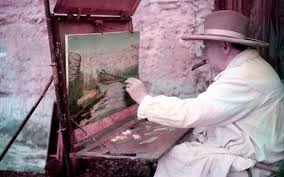 |
| Above: "M. Maurin" at the easel. Reports of his death in 1914 were greatly exaggerated. |
It came about like this. When Churchill made his first visit to Washington after Pearl Harbour in December 1941, it was announced in the press that he was there, and the chairman of the American Fine Arts Commission, who knew about the Charles Maurin scam, wrote a letter to Churchill at the White House addressed not to Mr. Churchill, but to M. Charles Maurin care of the White House, Washington. I mean, a very nice little joke, but the trouble was it didn't reach Churchill because it had to go through this rather ponderous, leaden-footed White House mail room who didn't know anybody called Charles Maurin staying at the White House. It wasn't opened until February 1942, and immediately sent up to Roosevelt 'cause it was quite plain who it was about. The letter actually says: "Dear M. Maurin, we're very happy to hear that you're not dead, as we had presumed from the biographies, but you're very much alive and well, and you're visiting Washington. We admire some of your works though not all of them. Would you like to come round to a coffee party (which, of course, given Mr. Churchill's reputation for sobriety cannot have been much of an attraction) would you like to come round to a coffee party when we can discuss the matter further?"
It was a nice little stranglehold that Roosevelt got over Winston.
The Jewish Connection
The price was small because Churchill was by that sum of money, bought. He was hired. He became a hired help.
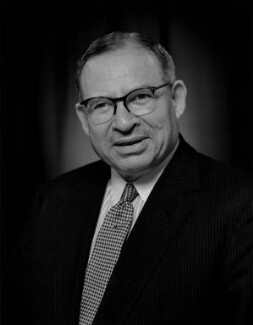 |
| Waley Cohen: passed the hat for War |
Now these are facts, I mean I'm not inventing this, the evidence comes actually from the authorised biography of the President of the Board of Deputies of British Jews, a man called Sir Bernard Waley Cohen, a very famous English Jewish family, he was in fact chairman of British Shell, I think, at that time, or BP or one of the big oil companies. And he had a dinner party on the night of July 29th, 1936, at which he passed the hat round for The Focus. And the number of city financiers who crawled out of the woodwork for this dinner party in Hampstead in North London, to Waley Cohen's flat, they wrote out cheques on the spot for twenty five thousand pounds for The Focus [1.5 million pounds in 2018 currency], backed up by a promise of another twenty five thousand pounds when that lot ran out. In other words fifty thousand pounds, a huge sum of money, in 1936, multiply it by 40 to get Canadian dollars today and you see how much money this group put up for the Churchill secret group The Focus in July 1936. [3 million pounds today, each ]
The price was small because Churchill was by that sum of money, bought. He was hired. He became a hired help. My chapter in my Churchill biography in which I deal with this extraordinary situation is called "The Hired Help". The only thing he was asked to do was to re-align his gun and point his cannon securely on Nazi Germany. Germany had to be the only target of Mr. Churchill in future.(6) Forget about India, forget about colonial policies, forget about unemployment at home, he had to attack only Nazi Germany. That was what he was being hired to do. And he was a brilliant orator, a wonderful speaker, he used all his powers of colourful language to bring the gun to bear on Nazi Germany from that point on, writing articles in the great, national newspapers, the Daily Telegraph, the Evening Standard, they all hired him(7), and of course he was getting money the whole time from the people who were backing The Focus.
Very interesting that Churchill was in a way ashamed about this. In fact Churchill writes to Randolph Churchill in one letter saying:
"I'm perfectly well aware of who are the people behind the money that is being pumped into my group now and I'm aware what this involves."
A rather sinister letter that Churchill admitted in a letter to his son Randolph Churchill at the time.
Strakosch saves the day
A perfectly timed American stock market crash and, hey presto, a Jewish banker steps in to save the day ....
Dear Mr. Churchill, we regret to have to inform you that all your American stocks and shares have become valueless overnight through a collapse on the American stock market .... Will you please take immediate steps to rectify this situation.
In February 1938, just as the Austrian crisis is boiling up, the first great major political crisis in Central Europe, in February 1938 Churchill got a letter from his London stockbrokers Vickers da Costa. Vickers da Costa, one of the biggest stockbroking firms in London, who were handling his share account, they wrote to him saying, "Dear Mr. Churchill, we regret to have to inform you that all your American stocks and shares have become valueless overnight through a collapse on the American stock market. You owe us nineteen thousand, six hundred pounds. Will you please take immediate steps to rectify this situation."
It's like a bank manager writing to any of you about an overdraft, you've got an overdraft suddenly which is completely unexpected of [1.2 million pounds in today's currency], overnight, which you didn't know was there and the bank manager's given you seven days to bring the matter into order, to find funds to pay into the account. Or else. Or else they'd foreclose on Chartwell, that's quite plain.
Churchill is frantic, this is February 1938. He writes a letter to his crony Brendan Bracken, who later became Lord Bracken, and said, "Can you ask your friends in the City what they can do to help me in this awful situation, if they can't help me now then I'm faced with the choice only of getting out of politics, going into the City, taking on directorships and of devoting myself to City directorships and my writing career, because if I finish my great work, 'The History of the English Speaking Peoples', then I can find enough money to pay off this appalling debt. See what you can do in the City however."
He puts his house Chartwell on the market. If you look in the newspaper libraries and you see in The Times of the 2nd April 1938, you'll see that Chartwell, Churchill's private house, is up for sale, twenty five thousand pounds. That would have paid off the debt and left him a little bit to spare. So that's the evidence of all this, as well as the letter that I just quoted ....
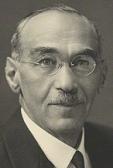 |
| Henry Strakosch |
[Then] out of the city woodwork which I mentioned before crawls an Austrian multi-millionaire with the name of Sir Henry Strakosch. Brendan Bracken has found him there lurking in the woodwork like a weevil and out comes Strakosch and announces in a letter through Brendan Bracken that "I will buy up all your debts". Strakosch agreed to buy all Winston Churchill's debts to the firm Vickers da Costa, paid him twenty thousand pounds, which left a few hundred pounds to spare. Bought up all the debts. The letter of agreement actually read that Strakosch would buy off all Churchill's debts, he would run the account, if the shares account in future made a profit, then the profit would go to Churchill, if it made a loss then Strakosch would very kindly cut that loss off with a knife and pay it himself, a very nice situation for Mr. Churchill.(8) Above all it removed his overnight nightmare for him.
Strakosh was an Austrian [Jew]. He'd fled to England in 1906, he'd come to England as an emigrant. He'd then gone to South Africa where he'd become a multi-millionaire in the gold mines. He returned to England as a financier, and used his finance in the City of London to become even richer ....
The Czech government gets its piece of Churchill
The Czech government started paying not only Mr. Churchill, but also every member of his political group The Focus. Colossal sum of money.
So the problem arises, where does he get the money from now?
Well I've got the answer because I've done a lot of work in the files of the Czech government. The Czech government started paying not only Mr. Churchill, but also every member of his political group The Focus. Colossal sum of money. We've heard before about five hundred pounds, about two thousand pounds, about twenty thousand pounds, the Czech government sent a payment, July 1938, 'cause obviously Czechoslovakia was next on Hitler's menu, the Czech government sent a payment in July 1938 to the ambassador in London, the Czech ambassador Jan Masaryk, for two million pounds [120 million pounds today]. Two separate payments. Not exactly two million pounds of course, it was the equivalent number of Czech crowns. All these payments are reported in the Czech files and I've actually seen the cheque book stubs, they were paid into a special account that Jan Masaryk set up in the Midlands Bank in London, not even the proper embassy account, and after Czechoslovakia vanished, at the time of the Munich agreement in September, and the subsequent entry into Prague in March 1939, after those events when the subsequent Czech government sent investigators to London to find out where the money had gone, Jan Masaryk refused to answer. He said that he'd used the money in the interests of Czechoslovakia and he didn't consider himself bound to answer to the new government as to whom he had paid the money to.
We know who he paid the money to from several sources. Firstly, the principal Czech intelligence agent in London was a Catholic priest. And he wrote a report in October 1938, after the Munich agreement which really wrote finis to Czechoslovakia, and this report is in the Czech files. And this principal Czech agent says, "It wasn't until two million pounds came in the summer of 1938, in July 1938, and were made available by our ambassador in London, that I was able to begin active subversive work among the opposition members of parliament, the Conservative opposition MPs, the Labour and the Liberal members of parliament who were all agreeing to overthrow Neville Chamberlain if they could. That made my work much easier, the funds made available through Jan Masaryk."
The plot against Chamberlain
Mr. Churchill is asking for more, Mr. Attlee is asking for more, but they guarantee that they will bring down Neville Chamberlain(9) and his government before any harm comes to Czechoslovakia.
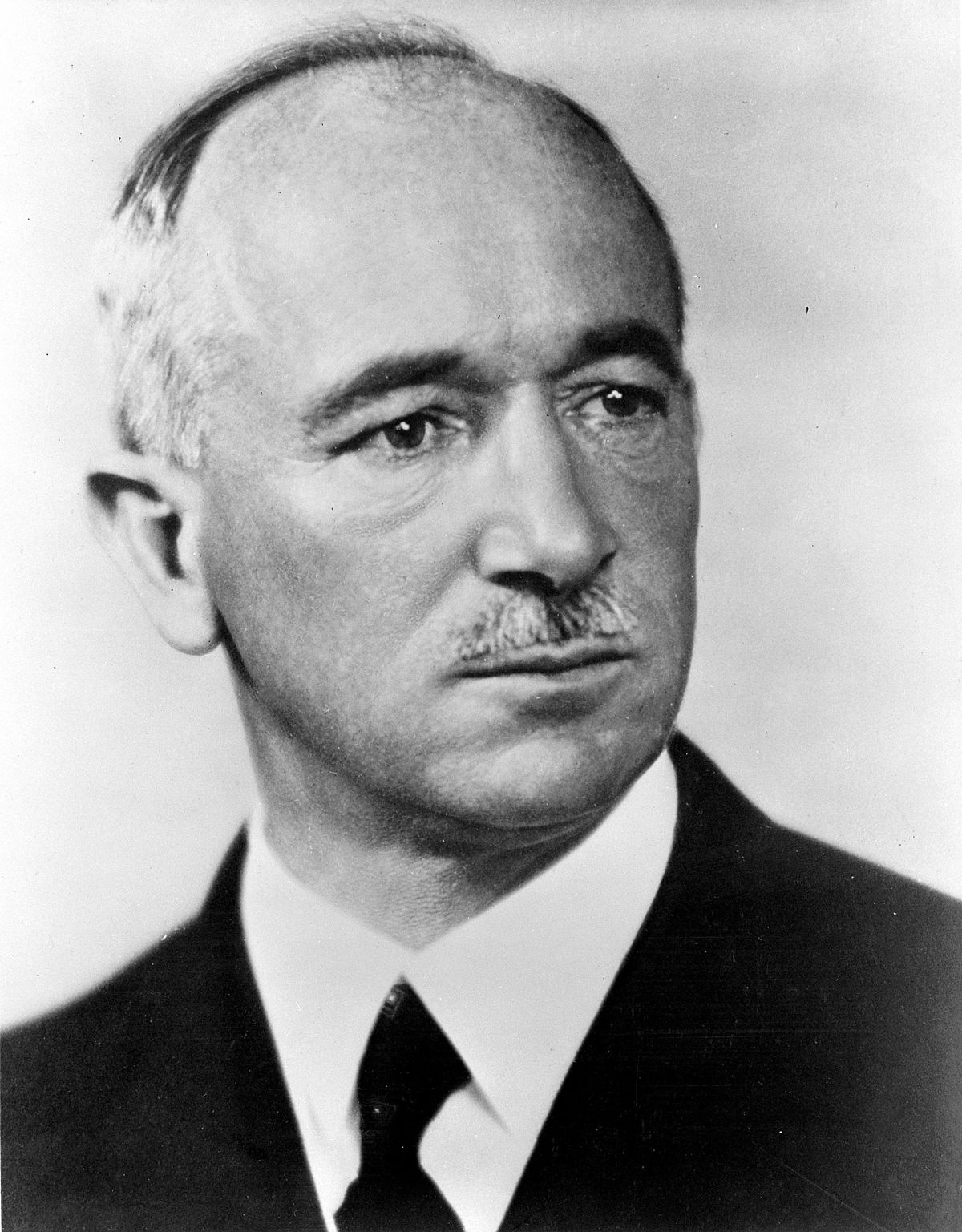 |
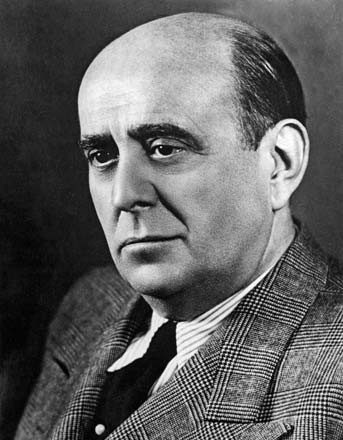 |
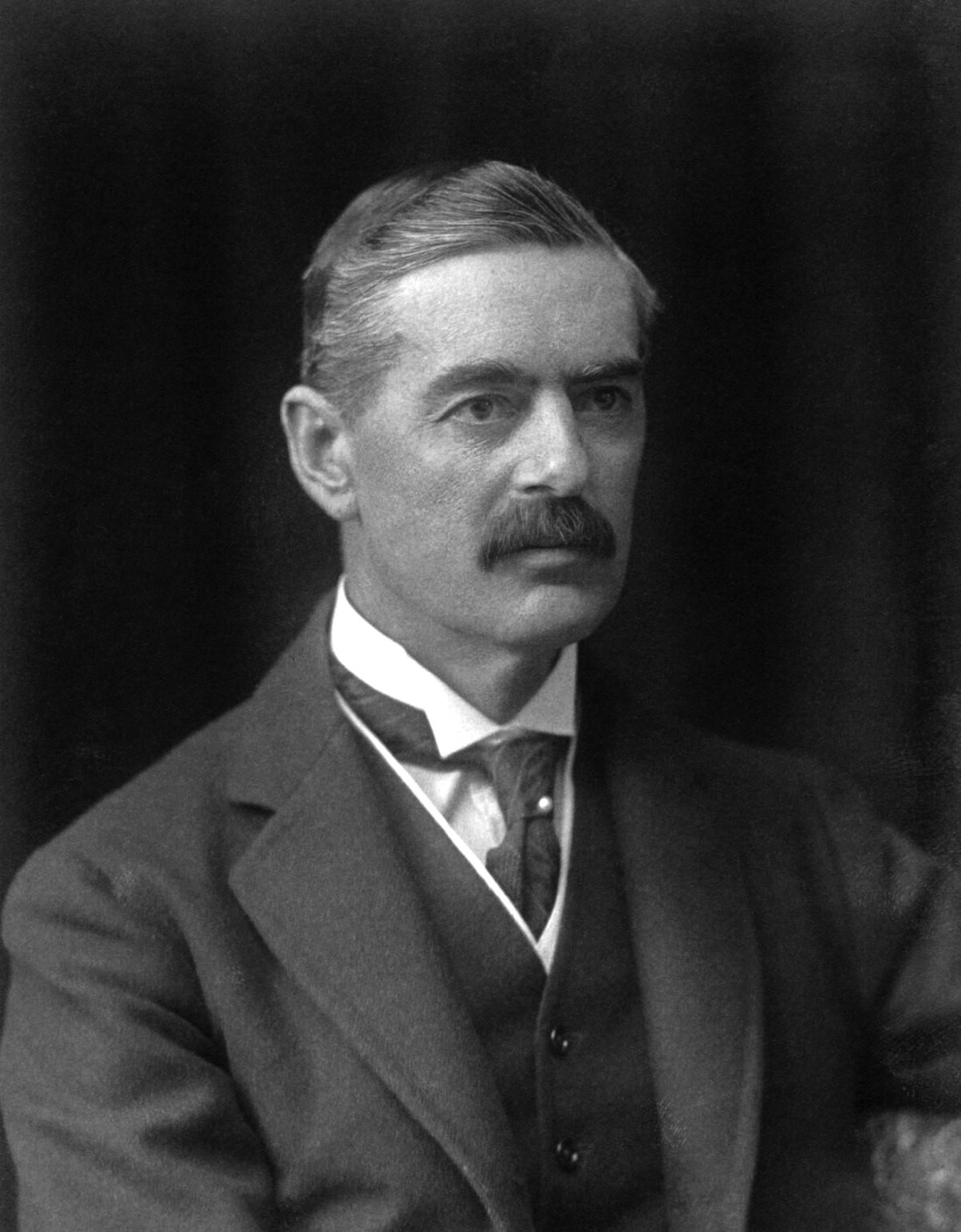 |
| Above: Czechoslovakian president, Dr. Edvard Beneš (left) and his ambassador in London, Jan Mazaryk(10) (middle) conspired with Churchill to topple Chamberlain (right). Churchill's political services were acquired in the usual way. | ||
Jan Masaryk himself frequently telephoned to Dr. Benes, the Czech President in Prague. London, Prague, the telephone line ran across German territory. The Germans listened in in their rather ungentleman-like way, we know how ungentleman-like the Germans can be when they try. They had ways of finding things out. And they listened in to this telephone call between Benes and Masaryk repeatedly .... they wrote the transcripts of these Czech conversations on brown pages of paper .... and on 23rd September 1938, seven days before the Munich agreement, Hitler was tactless enough .... he gave the entire folder of the transcripts to the British ambassador in Berlin, Sir Neville Henderson, and said, you'd better show your boss what is going on behind his back.
Churchill, according to Jan Masaryk: "Mr. Churchill is asking for more, Mr. Attlee is asking for more, but they guarantee that they will bring down Neville Chamberlain and his government before any harm comes to Czechoslovakia." Churchill asking for more. The transcripts were handed by Henderson in Berlin immediately by courier to the foreign office in London, you can see them in the British archives now, that's where you find these brown pages .... what is quite plain .... is that they were horrified by these references to Churchill's machinations because they put three lines in the margin in pencil and a row of exclamation marks, "this is what Winston is up to!!!" And Chamberlain writes to his sister saying I have proof now from the most extraordinary source of what Churchill is getting up to behind my back.
"No hope of a seat in the commons", writes this wife of General Edward Spears, "Go to the cinema with Helene. Hitler is hissed during the newsreel. Doug Cooper's statement good, but not in my opinion inspired. There's talk of a general election. Kingsley-Wood is trying to work it. If there is one .... my husband will lose his seat probably. Faced with the prospect of losing two thousand pounds a year from the Czechs and his seat in parliament .... "
Oh dear. Faced with the prospect of losing two thousand pounds a year and his seat in parliament. What a tragedy. How shameful it is for me now as an Englishman to come along, born in that very year of 1938 when our Empire was at its zenith. In fact it grew even larger over the next seven years with the territories that were mandated to us as a result of the hostilities. And then to see it all go pop like that soap bubble I mentioned earlier because of the feckless followers of one corrupt politician into whose hands it had been vested in May 1940. "A drunken poltroon", as Hitler called him, and I think that he used the word "drunk" with great temerity, and absolute veracity.(11)
They take these documents, the archives, and they cut off the head and the feet and the arms because they can't make it fit into their bed otherwise. And that way of course they don't really deserve the title of historian.
You wont find that document referred to anywhere by the historians either, the historians of the Holocaust. They act as though these documents don't even exist. They're authentic, there's no question, they can't challenge the authenticity. But they act rather like a card sharp, like somebody who cheats at cards, who drops the incriminating ace of spades, whatever it is, on the floor, and then he puts his flat foot on it. Then with that foot he shuffles it under the table and hopes nobody has seen him doing it, and he'll pick it up later. And so it is with the historians. These documents that they can't fit in to the acceptable hypothesis, they pretend that these documents don't exist. Which of course is not the scientific way of doing things at all. A scientist has to set up a hypothesis and make his hypothesis fit the documents, fit the facts, and not make the documentary archives fit into his pre-arranged, pre-conceived notion. That's all the wrong way of doing it. They take these documents, the archives, and they cut off the head and the feet and the arms because they can't make it fit into their bed otherwise. And that way of course they don't really deserve the title of historian.
I've said to the German bodies of students that I've spoken to(12), I've spoken to a thousand students in Bonn only two or three years back and I told them about [one of the documents referred to above] and so on. And they were absolutely silent. They had no idea either. And I said, "The reason why you're silent is it's taken me as an Englishman to come forty years after the event and tell you about documents that your own professors sitting here in the front row .... haven't told you about. And the only explanation why they haven't told you about these documents is either they didn't know the document existed, they were ignorant of this document, in which case they're really incompetent and not fit to be your professors; or more likely they did know about this document, but they've decided to suppress it because they can't make it fit in with the accepted theories. In which case they shouldn't be your professors either."
And that is how it is. The historians [have] faked and faked and faked. They faked to blacken the name of Hitler, to justify our war against him, and they faked to purify the name of Winston Churchill, who fought this drunken war(13) against Germany and against Europe for no other purpose than the glorification of his own name.
Churchill could have 'settled out of court' in June and July 1940 on honourable terms which would have preserved Britain and the British Empire which I've always considered to be one of the great civilising, culturing influences in the history of the world. We would now have been the predominate force on the world, the British .... We could have been dictating the terms of peace and civilization today.(14)
Because incredible though it now seems when we look back, at that time in the Summer of 1940 not one German bomb had yet fallen on a British town. Mr. Churchill knew why, because we were reading the [German] codes, the famous "Ultra Secret" which is now common knowledge. At that time we had begun reading the German air force code in May 1940, we were reading the German Navy codes and above all we were reading the German Embassy codes. So we were reading what Hitler's orders were more often than not. And Churchill knew by the Summer of 1940 that that man in Berlin had given wicked, wicked, wicked orders that no British town was ever to be bombed. The British were to be allowed to begin the bombing war. And above all an absolute embargo on the bombing of London.
 |
| Above: Joseph P. Kennedy with his son John(16), the future ill-fated US President, shortly before the outbreak of WW2. |
Churchill must really have wrung his hands in despair. How could he hope to bring the British people behind him for a prosecution of the war under those terms? He had told Ambassador Joseph Kennedy (famous father of the later President), Joseph P. Kennedy(15), whose diary I've partly read, the parts that matter, and whose telegrams to Washington I've also dug out of the archives in Maryland and read as well. He had told Ambassador Kennedy that he actually wanted Hitler to start bombing London because this would bring an end to the awful peace movement that was causing him such problems in England. And above all, when the Americans saw the barbarity and the frightfulness of the Nazi air raids on England begin, and towns like Lincoln and Boston beginning to suffer, then surely that must bring the Americans into the war on the British side. What cynicism and hypocrisy to actually want the bombing of your own capital city to begin!
Not that Churchill would have minded of course. He alone had an air raid shelter with seventeen feet of concrete in the roof, the famous Cabinet war rooms that you can go and visit now, when you go as a tourist to London you will see the Cabinet war rooms .... Buckingham Palace didn't have a shelter, the King and Queen didn't have a shelter. (Harry Hopkins goes to London a few months later in January 1941 and he finds the King and Queen taking shelter in a cupboard under the stairs in Buckingham Palace.) Mr. Churchill had seventeen feet of concrete in the roof. He didn't feel safe there, he used to go in fact to an underground tube station on the Piccadilly line, the old Down street station, and he would be there four hundred feet underground, and he would take refuge there. That underground station has remained permanently closed now because of the reconstruction work that was done for Mr. Churchill in 1940 ....
Lord Lothian wants to find out the peace offer and this is the one thing that Churchill can't possibly afford, that the British find out what the Hitler peace offer is ....
But until the Summer of 1940 not one bomb had dropped on an English town. He had to provoke it somehow. Now I ask you to consider one date in English history, it's not a famous date, like the Battle of Britain day, September the 15th, or the 1st of September when war broke out. Look at July the 20th, 1940. This is one of the most significant dates. On that day Churchill is lying in bed as his wont in Chequers his country house, the Prime Minister's residence, out in the country, Sunday morning, and he gets the intercept, a decode, the decrypt, of a German embassy telegram from Washington to Berlin. The German ambassador in Washington, one Hans Thomson, reports: "The British ambassador Lord Lothian has secretly put out feelers to me to ask what our peace offer is, through an intermediary, through a Quaker intermediary .... " Lord Lothian wants to find out the peace offer and this is the one thing that Churchill can't possibly afford, that the British find out what the Hitler peace offer is. [Because it is so eminently reasonable.] That would be the end of Churchill of course. He sends an immediate telegram to Lord Halifax, the foreign secretary, saying put the stop on your ambassador in Washington immediately, he is not allowed to contact the German ambassador. He sends a telegram to Lord Lothian in Perth, the British ambassador saying: "You are not to have any further dealings with the German ambassador whether directly or indirectly."
And on the same day, and this is what makes July the 20th, 1940 so important, Churchill sends for Sir Charles Portal, Air Chief Marshall, Sir Charles Portal, Commander in Chief, Bomber Command, and he says, "When is the earliest day that you can launch a savage attack on Berlin?" And Sir Charles Portal says, "Prime Minister we can't do it yet, because the nights are too short, we can't get our squadrons from England out to Berlin and back in the hours of darkness. We can do it in September, but not yet, and in September of course we will have the new generation of bombers, the Sterling heavy bomber will be there and we can use them, we'll have a hundred of them. But I warn you that if you do that then the Germans will retaliate. At present they are not bombing our cities or our towns, their entire attack is being dedicated to the RAF fighter defences."
The air fields, the radar system, the sector stations, were being remorselessly knocked out one by one by the German attack. The Battle of Britain had begun of course. But it was only being devoted at that time to the dockyards, the blockade, the shipping and the fighter stations, not to the towns or the cities. And Churchill, when Sir Charles Portal uttered this warning that the enemy might retaliate, Churchill just twinkled. Well we know why. Because he wanted the attack to begin. But he was reading the German signals which said that they had no intention of attacking London. So we can understand why two weeks later when General Charles De Gaulle visits him out at Chequers, again a Sunday, he finds him on August the 4th, 1940 .... standing in the middle of his lawn shaking his little fist at the sky, his little pink fist, and saying, "Why won't you come?" You read Charles De Gaulle's memoirs and you will see this. De Gaulle doesn't understand what this little scene was all about, but we now know. Churchill was wondering why the Germans were not going to start bombing. Why they were refusing to start. He couldn't understand it.
And [Churchill] gets his chance on August 24th, 1940, when one German plane flying in from the west along the Thames flies one loop too far along the Thames and drops its bombs not on Rotherhithe where the oil refineries are that he's supposed to be bombing (the oil tanks), but on the East End of London. A stick of bombs falls on the East End of London, just inside the boundaries of Greater London, and kills a large number of chicken and blows in several windows, and flattens a couple of these old Dickensian tenement buildings. And Churchill has his pretext.
He gets the news that Saturday night, Sunday morning. And on Sunday morning August the 25th, 1940, at ten minutes past nine in the morning, Churchill personally telephones the headquarters of Bomber Command at High Wickham in Buckinghamshire, and he speaks with the deputy commander in chief of Bomber Command Air Vice Marshall Sir Norman Bottomley, and says, "I want a minimum of 100 bombers to attack Berlin tonight in retaliation for this savage series of raids on London." This is Mr. Churchill. And I mean, you don't need to have access to the Churchill files to know this because it's in the files of Bomber Command. And the records of Bomber Command which have now of course been placed in the public archives in England, you can see the actual transcript of Churchill's telephone conversation, between Churchill himself out in the country and Air Vice Marshall, Sir Norman Bottomley in Bomber Command Headquarters. You note the chain of command, a direct telephone link from Churchill to the Bomber Command Headquarters bypassing the Cabinet, bypassing Parliament, bypassing the Air Ministry and the Secretary of State for Air, this wet Liberal, Sir Archibald Sinclair, a telephone call direct to Bomber Command Headquarters, although it's going to have immense political consequences.
And that night a hundred bombers go out to Berlin and thirty get through and do quite a lot of damage in the west end of Berlin killing several people. And over the next ten days RAF Bomber Command repeats this raid six or seven times. Sometimes missing completely, sometimes getting through and doing considerable damage and causing civilian casualties. Still Hitler refuses to respond. This is the interesting thing, Hitler in his madness still thinks that he can persuade the British to accept his offer. On that final day, September the 4th, 1940, after there had been seven raids, Hitler sends for a lawyer called Dr. Ludwig Weiser and sends the lawyer to the Stockholm embassy of the British, to speak to the British ambassador and tell the British ambassador there what the peace offer is. But the ambassador Victor Marrot tells this lawyer Weiser: "I'm sorry, my orders are I'm not allowed to accept any German emissary on the embassy premises, and I'm not allowed to listen to anything about German offers - Mr. Churchill's personal orders." (17)
You've told me so frequently about your contacts in England and Scotland, please will you do your utmost now to establish contact personally with these people and tell them what our offer is? We don't seem to be getting through to the British public.
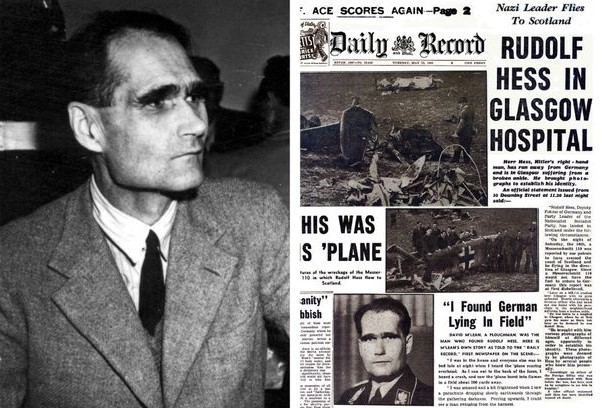 |
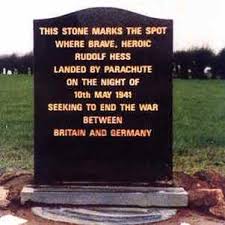 |
| Above: The extraordinary peace mission of German Deputy-Fuhrer Rudolf Hess. How many nations' second-in-commands these days would have such courage for the sake of peace? | |
Hitler sends for Rudolf Hess, that same day, September the 4th, and says to Rudolf Hess, "You've told me so frequently about your contacts in England and Scotland, please will you do your utmost now to establish contact personally with these people and tell them what our offer is. We don't seem to be getting through to the British public." And this of course is the beginning of the famous Rudolf Hess peace mission, his tragic flight in May 1941, his first ever parachute jump in his life, middle of the velvety hours of blackness, he makes his first ever parachute jump, and lands only twelve miles away from the man he's gone to see, the Duke of Hamilton. And on the same day, that same September the 4th, 1940, Hitler makes a speech in the Sport Palace in Berlin and says: "If that poltroon, that drunken poltroon in England once more attacks us, if he sends aircraft with ten kilograms of bombs we'll send a thousand kilograms, if he sends a hundred planes we'll send a thousand bombers to attack their cities, if he attacks our cities anymore, then I will eradicate theirs ...." His famous, one of Hitler's most famous speeches.
And Churchill's ears prick up. This of course means he's getting exactly what he wants. He sends an order to Bomber Command, "You are to launch another violent air raid on Berlin at the earliest opportunity", that same afternoon. And on the following day September the 5th, the bombers return to Berlin, whereupon Hitler lifts the embargo. I've got the diaries of the deputy chief of operations of the German Air Force, the diary of the chief of the Number two under Goering and so on. We know the exact sequence of events, there can be no doubt whatsoever as to the sequence. And on the afternoon of September the 6th, 1940, the East End of London reverberates to the approach of enemy bombers for the first time on a colossal scale, a thousand bombers come up the Thames, far past the military oil refineries, the oil tanks along the Thames, the dockyards, they come right into the East End and bomb the dockyards, the East End, the factories, the workers' homes, they set street upon street and entire suburbs in flames, the whole East End of London is covered in fire and smoke that afternoon, that Saturday afternoon.
Mr. Churchill has his way, he's been out in the country of course, because he knew from code-breaking the raid was coming. He comes back the following day in his big black Humber limousine, puts on an Air Commodore's uniform, I don't know why, he wears an RAF Air Commodore's uniform to tour the East End of London to see the damaged areas. He climbs out of his car, he finds entire streets have been levelled, pathetic heaps of rubble with English Union flags sticking out on top that had been issued the hour before by Ministry of Information officials. That's part of the propaganda story of course, you need the pathetic people, the union flag bravely fluttering, Mr. Churchill walking around with his Air Commodore's uniform, the old women who've lost everything, their family, their household, their radio sets, the budgerigar, everything has gone up in flames, they've saved perhaps just the kitchen stove. But there's Winston Churchill their Prime Minister waddling around with his cigar and they're saying to him: "Good old Winnie, Good old Winnie, we knew you wouldn't desert us, we knew you were here. London can take it." And this became the title of a famous film, "London Can Take It". That's the title of one of my chapters of my Churchill biography, "London Can Take It."
The trouble was that Mr. Churchill could not. He was never once in London when an air raid came. He knew in advance when the air raids were coming from the code-breaking. An only once or twice out of accident, when the code-breakers failed him, was he caught in the midst of an air raid in London in the depths of his bunker. He no longer went out to Chequers when the air raids came, because Chequers also (the famous residence of the British Prime Minister) was also endangered. He selected the private country house of a Conservative member of Parliament, one of his Focus group of course, he'd rewarded the Focus group members of Parliament, and Labour, Liberal and Conservative opposition people who had backed him up in the wilderness, he had rewarded them all with cabinet posts and high office. One of them, Ronald Tree, had a country house out in Oxfordshire called Ditchley, and Churchill drove out there every time the code-breakers told him that a raid was due. A hundred and fifty miles away - there he felt safe. And he would drive back the following morning in order to be seen .... this is the true image of Churchill. And if you think I'm being unjust on Churchill then consider the case of Coventry.
The Coventry Farce
.... the real story of Coventry is where Mr. Churchill was that day ....
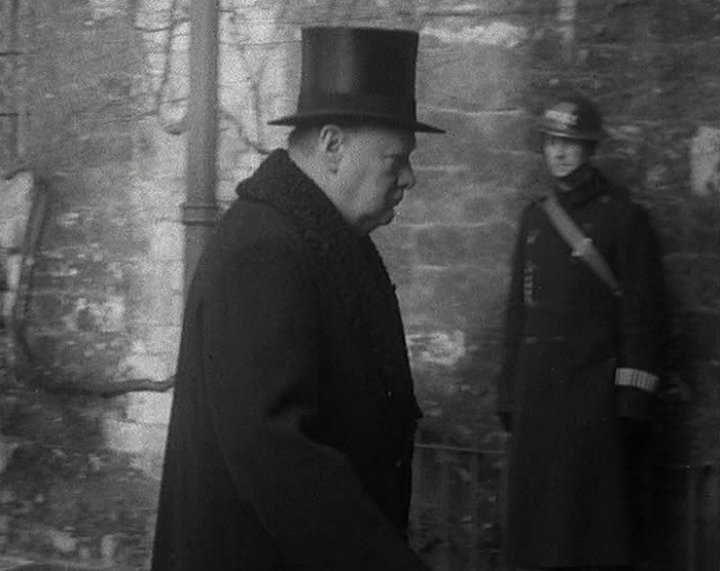 |
| Above: Churchill attends the funeral of Neville Chamberlain at midday on the 14th of November, 1940. He had more on his mind than most could have realized .... |
The famous, legendary air raid on Coventry .... Coventry of course, we all know what it means, the most barbarous air raid on Britain during the war, 300 people were killed there I believe, altogether, slightly over three hundred perhaps, enormous industrial damage .... but the real story of Coventry is where Mr. Churchill was that day.
You see Churchill was told two days before that, that there was going to be a barbarous air raid on .... Britain, the Air Ministry sent him a message which is in the Air Ministry files now, and they said: "Prime Minister, we have just received intelligence from our code-breaking office that the Germans are going to carry out a vicious air raid in three consecutive nights with their entire air force, all three Luftflotten, all three air fleets, over a thousand bombers escorted by fighter planes are going to attack a target. We know the second priority is outer London, the third priority is the Thames Estuary, the fourth priority is the Home County, so it stands to reason that the top priority is the centre of London. They're going to attack it night after night for three nights, code-named 'Moonlight Sonata' (Mondscheinsonate) so it stands to reason that the first night is going to be the first full moon night." And Churchill says: "When is this?", and the Air Ministry says, "Well the first full moon night is the night of November the 14th, the 15th."
And comes the morning of the raid, November the 14th, he goes about his business as usual, he's got a full program that morning, November the 14th. He goes to Westminster Abbey at midday for the funeral of poor old Neville Chamberlain, who's died a few days previously of cancer(18), that's one reason why he wasn't able to continue in office in fact. And then he comes back from Westminster Abbey, Churchill asks the latest state of play and the Air Ministry tells him in a message which is in the files: "Well in the meantime we have now intercepted the radio report of the weather plane, so tonight Prime Minister, is the night. And on our information we believe the target is still central London."
Except that Sir John Martin himself doesn't realize what he's shown me, because he has only half the picture, he doesn't have the desk diary, he doesn't have the Air Ministry signals which I'm quoting to you. At four o'clock Churchill climbs into his big black Humber limousine to get out before the bombers come. As he's about to drive off, a despatch rider arrives from the Air Ministry, Sir John Martin told me this, he said that the envelope was handed in through the window and "as we were driving off, Winston and I, past Hyde park, we just got past Hyde park when Winston leans forward and raps on the glass: 'Driver, back to number 10 Downing street!'" The message from the Air Ministry had said: "Prime Minister, we have now received word from our radio intelligence plane that they have detected the German blind bombing beams intersecting, intersecting not over London as we had thought, but over Coventry, so the target for tonight is Coventry, not London after all. "Driver, back to number 10!".
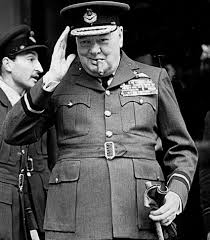 |
| Above: Churchill in Air Commodore uniform. One independent reviewer of Irving's Toronto talk wrote: "I can imagine Benny Hill's theme tune playing while Churchill dodges air raids." |
[Churchill] goes back to number 10 Downing street where all his staff are waiting for him, because he hasn't told his secretaries to take the afternoon off, he hasn't said to them, girls wouldn't you like to go and have three days by the seaside or something? Or go and visit your aunt up in Newcastle, he's let them all work on in the centre of London. He himself has betaken himself to the countryside. He comes back and they look at him astonished, round eyed with astonishment, and they say: "Boss you are back!" And he says (this is what Sir John Martin tells me): "I have just received the most doleful intelligence from the Air Ministry", and he waves the closed brown envelope in his hand, which he doesn't tell them what's in it: "that tonight a most violent and barbarous enemy air raid is expected on London, our fine capital city", (on London), "and it would not be right for the citizens of this hard pressed metropolis to gain the impression that I'm not willing to suffer the same trials and tribulations, to go through the same misfortune and sacrifice that I'm asking them to bear. I have therefore decided to come back and share their misfortune with them."
And that night at eight o'clock, according to Sir John Coleman in his private diary (another of the secretaries), Churchill goes up onto the roof of Number 10 Downing street, bares his portly waistcoat, and says: "I am ready for them to attack now. Let them now start bombing and do their damnedest, I will stand here and take it!", knowing full well that the target for that night is Coventry three hundred and fifty miles away. It's a rather sad story about Mr. Churchill, but as President Reagan might say: "You aint heard nothing yet!".
Churchill the alcoholic
.... these famous speeches of Mr. Churchill, which were broadcast in the evening by the BBC, were not broadcast by him at all. Because in the evening he was in no condition to broadcast ....(19)
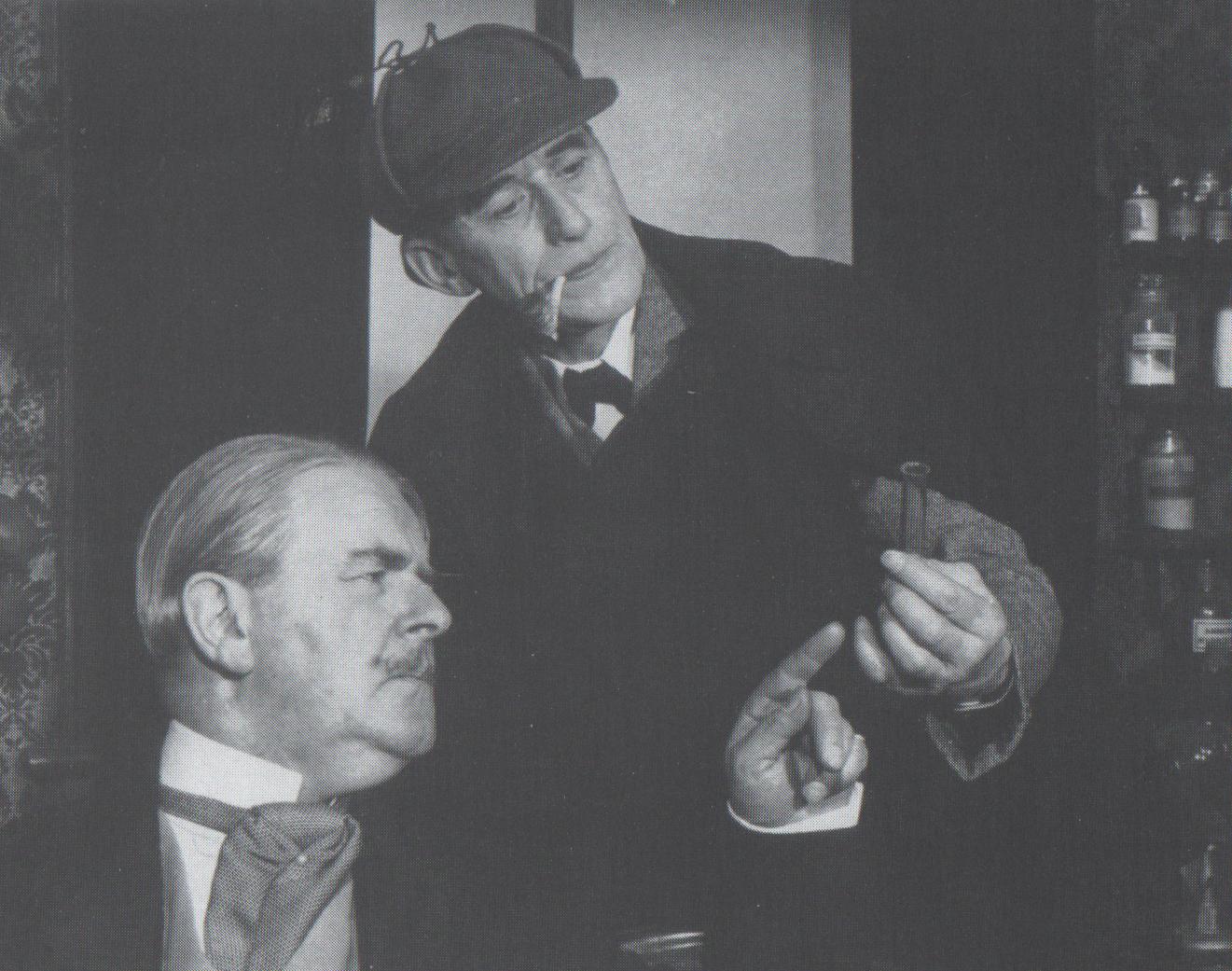 |
| Above: Actor Norman Shelley plays Dr. Watson in a 1950s production. Shelley is perhaps best known as the voice of Winnie-the-Pooh, and least known as the voice of Winnie the, er, unavailable .... |
I mentioned earlier [Churchill's] habit of attending Cabinet in a certain condition. It first comes to our attention, in fact, when we find out that the famous war time broadcasts of Mr. Churchill, "Blood, Sweat and Tears", "We Shall Fight on the Beaches" .... these famous speeches of Mr. Churchill, which were broadcast in the evening by the BBC, were not broadcast by him at all. Because in the evening he was in no condition to broadcast. The actual broadcast voice was that of Norman Shelley who I became quite a close friend of. Those of us who were in England during the war and heard the broadcasts, we may remember also that at 5pm every evening we'd be listening to "Children's Hour". And at 5pm Children's Hour there was this long-running children's series called "Toytown", and in Toytown one of the principal characters was "Larry the Lamb". Larry the Lamb bleated. Baaa. Like that. And the man who did the "baaa" was Norman Shelley.(20) And Norman Shelley was also the best mimic of the Churchill voice. And he was the one the BBC hired to read the Churchill speeches in the evenings, because Churchill himself could not. Norman Shelley confirmed all this to me and it's confirmed in the archives of the BBC.(21)
You see, Churchill, and this was one of the great tragedies of the Second World War, well he was clinically an alcoholic. There are various clinical definitions for what an alcoholic is, the signs you look for, I mean we all know what they are, but there are various other things, like a rudeness when you come for a meal and you find that no alcohol is served. This happened during the war, 1943, when Churchill arrived for a state banquet with the Sultan of Morocco, and of course there was no alcohol served at all there, and he was not only rude, he was outrageously rude. President Roosevelt was also present and had been warned and he was better behaved, and if you read the private diaries of many of those who were present, the rudeness of Churchill on that occasion went down in the memories of many men, General Patton for example, he was present, and he records this in his private diaries. The Sultan of Morocco was hideously offended by Churchill's behaviour.
Or the private diaries of Captain Ralph Edwards for example, who was the Director of Operations in the Admiralty under Churchill, his First Lord at the time of the Norwegian operation. We haven't got time to read them all of course, but I'll read just the salient points. Of course what happened was Churchill had wanted to invade Norway himself. He had got an invasion force aboard three cruisers, the three cruisers sailed, he then called them back, he unloaded the forces because he thought the German High Fleet was sailing. He had visions of another Battle of Jutland. He sailed the force in the wrong direction, realises his mistake, recalls the cruisers, puts the guns and the ammunition and the men on the ships, but all on the wrong ships, he put the guns on one ship, the men on another ship, the ammunition on another ship, he landed them on different parts of the Norwegian coastline.
There was a Gallipoli-like fiasco of which Churchill had proven himself so magnificently capable. The result was the fiasco which finally cost Neville Chamberlain his seat. The Germans in the meantime landed - a brilliantly executed, hazardous operation which cost them almost their entire Navy, but they managed to carry it off. They landed everywhere. "Norway invaded during the early hours this morning", so writes Captain Edwards on the 9th April, "invasions everywhere including even Narvik. What a chance we've missed!" Then later on he writes:
"Pure cold feet, it should have been done. Winston ratted and so did The First Sea Lord. Never win a war like this. Blast them. Damn them. Winston's an infernal menace, may well lose the war for us."
Then April the 11th, two days later:
"a very long meeting with Winston Churchill who was again half tight [drunk]."
Now you read this reference in the original diaries as I have, written in ink, you can't mistake the handwriting, there's not a question of that. But you see that the official British historian, Captain Stephen Roskill, who quotes this in his books, has re-quoted it, has re-worded it to read, "meeting with Churchill, who was very tired." Now there's a significant difference between half tight and very tired.
Oh again, July the 6th, 1944, the private diary of another sea dog, Admiral Cunningham, Admiral Sir Andrew B. Cunningham, who became our First Sea Lord the year before this, he attended therefore the Cabinet meetings, the Defence Committee meetings, he too was horrified to find the condition Churchill was in as he conducted his war. Blind drunk again and again. I read only one entry, July the 6th, 1944. "There's no doubt the PM is in no state to discuss anything. Too tired and too much alcohol. He was in a terrible mood this evening. Rude and sarcastic. Had a couple of blows with him about the Far East. The net result was that we sat from 10pm to 1:45 listening to him talking mostly nonsense and got nowhere."
And you may think that this is a bit much, the hour's getting late, and you don't want to hear any more about Churchill's drunkenness, but the decisions he ordered on this particular day show what he was capable of when he was drunk.
Here we have the actual documents he issued to the Chief of Staff that day, July the 6th, 1944, signed by him. He orders the dropping of poison gas bombs on German towns and cities. The opening of poison gas warfare. Forbidden ever since World War I with signed solemn conventions and treaties promising that we would never, ever launch poison gas warfare without being attacked first in this manner. We'd signed the treaties, yet here's Churchill saying "Do it!" Because the flying bomb offensive has begun against England, the V1 flying bombs are coming over, they're causing havoc in England. British morale is almost completely at an end. And now, out of the blue skies suddenly comes the flying bomb offensive. Thirty thousand homes a day being wrecked in the south of London by the V1 flying bombs.
And on the 6th of July, Churchill orders the dropping of poison gas, not only poison gas, he also orders the release of two million Anthrax bombs, bombs laden with Anthrax, very little of this is known of course now, 'cause he's our Great Hero. We tried one Anthrax bomb on a Scottish island during the war to see its effects and that island is uninhabitable today, it's prohibited territory, you're not allowed to set foot on it, because it is still completely - well you are a farming community yourselves, a lot of you, you know what Anthrax does.
If we had released two million Anthrax bombs that were prepared and charged in England, if we'd released them on Germany at that time, the whole of Western Europe would still be completely uninhabitable today, not just West Germany of course, 'cause it would spread. And not just for the duration of the war. In his drunken stupor Churchill ordered even that.
If we had released two million Anthrax bombs that were prepared and charged in England, if we'd released them on Germany at that time, the whole of Western Europe would still be completely uninhabitable today, not just West Germany of course, 'cause it would spread. And not just for the duration of the war. In his drunken stupor Churchill ordered even that. Heedless of the conventions, heedless of Geneva, he ordered this war crime. "I want you to think very seriously over this question of poison gas", he says. Then arguing why it's reasonable to turn a blind eye on Geneva, he says:
"It is absurd to consider morality on this topic when everybody used it in the last war without a word of complaint from the moralists or the Church. On the other hand, in the last war the bombing of open cities was regarded as forbidden. Now everybody does it as a matter of course.(22) It is simply a question of fashion changing as she does between long and short skirts for women."
What they don't realize of course is that the Germans have secretly designed poison gasses far more lethal than anything we had. Mustard gas and the rest of them, they were phooey. They were peanuts compared with the poison gasses the Germans had designed. The Germans had the first nerve gasses already stockpiled .... Tabun and Sarin had already been designed. The nerve gasses against which we had no defence. [The Chiefs of Staff] argue against it on these grounds, military grounds. And Churchill replies on July the 29th: "Clearly I cannot make head against the Parsons and the Warriors at the same time." That's Mr. Churchill, our magnificent hero, the greatest living Englishmen, now thank God, passed on.
But his image is still untarnished, his image is still unfortunately there. We worship the image of Winston Churchill as though this man was not the gravedigger of Britain .... and all that we once held dear.
(Click the note number to return to its position in the transcript.)
(1) Irving is paraphrasing. The exact quote is: "In wartime, truth is so precious that she should always be attended by a bodyguard of lies."
(2) The British people did not finish paying off the last World War Two loan from chief lender the US until 2006, more than sixty years after the end of the war, and thirty years after a Sterling crisis in the 1970s forced a third world style hand over of the nation's domestic policy to the IMF. Clearly, whoever else may have profited by the Second World War, it wasn't the British people.
But actually, Britain lost more than its Empire or its financial stability. More importantly it lost its soul, as evinced by the social disintegration and moral degeneracy to which it has sunk since (dragging much of the world with it); and the false ideologies it largely continues to swallow hook, line and sinker.* There remains, however, a remnant of the spiritual robustness, integrity and independence that largely characterised it in former days and may yet save it in these, God willing. Must save it, in fact. Not only for Britain's sake, but for the whole world; especially its former colonies over which it still exerts a considerable influence and for whom it will have to answer.
*America suffered a similar fate.
(3) Rather tellingly, neither the British nor the French declared war on Stalin when he did exactly the same thing to the Poles for which war had been declared by both nations on Hitler only a couple of weeks earlier. Indeed Churchill and Roosevelt effectively handed Poland over to Stalin with their blessings at the end of the war.
(4) Territories which had been essentially stolen from German peoples at the end of the the First World War, or misappropriated, thus sowing the seeds for the Second.
(5) Irving did not confine his criticism to German professors. He prefaced this part of his talk with:
"I like being plain "Mister". And I let the professors run around in circles trying to establish the truth by cribbing from each other. You see this is the way the Americans and the Germans and the British historians do it. They can't afford the research that I do. The Germans least of all ...."
(6) In a speech in April, 1919 Churchill had stated:
"Of all the tyrannies in history, the Bolshevist tyranny is the worst, the most destructive, and the most degrading. It is sheer humbug to pretend that it is not far worse than German militarism."
By the time of the Second World War however, and the years immediately following the receipt of substantial financial favours from Jewish sources, Churchill had apparently changed his mind about the relative threat of Bolshevism, a political movement which he identified entirely accurately in a February, 1920 article for the illustrated Sunday Herald as a chiefly Jewish enterprise.
(7) In December 1938 Lord Beaverbrook, owner of the Daily Express, observed: "The Jews have got a big position in the press here [meaning London] .... The Jews may drive us into war." He was one voice among many well aware of who was actually at war with Germany.
(8) Perhaps Strakosch was familiar with the true nature of Wall Street by the 1930s in ways that the ordinary investor wasn't.
(9) Neville Chamberlain famously said of British involvement in the Germany-Czechoslovakia border dispute:
"How horrible, fantastic, incredible it is that we should be digging trenches and trying on gas masks here because of a quarrel in a far-away country between people of whom we know nothing."
Chamberlain might have said the same thing, with equal validity, of the Germany-Poland border dispute which would later serve as the catalyst for the Second World War.
(10) The Case of the Disgruntled Diplomat
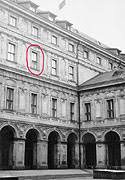 |
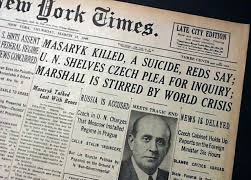 |
| Above left: scene of the crime, Czerninsky Palace, Prague. More recently Mazaryk has fallen a posthumous victim to a particularly flexible form of weaponized psychiatry. | |
The death of Jan Mazaryk in March 1948 makes an interesting case study.
Like the demise of US General George S. Patton a few years earlier it is curiously reminiscent of the death of US Secretary of Defence James V. Forrestal a little over a year later in Washington (see Note 15). The similarities are, however, even more striking in the case of Mazaryk in that they are forensic as well as circumstantial in nature.
Like Forrestal, Mazaryk was found dead beneath a window of the building to which he had been more or less confined in the period leading up to his death. And like Forrestal, despite indications that he had been the victim of violence before falling from the window, a verdict of suicide ensued that somewhat beggared public belief both at home and abroad. Apparently a ditty popular in Prague at the time ran as follows:
"Jan Masaryk was a very tidy man. He was such a tidy man that when he jumped he shut the window after himself."
Indeed, following a relatively recent forensic investigation in 2004, Czech authorities have seen fit to officially confirm (albeit over half a century after the fact) what to many was already obvious: that Mazaryk's death was the result of murder.
There has been much conjecture over the years as to who the perpetrators may have been (ranging from British MI6 to the Soviet secret service), and much obfuscation too no doubt. What does seem clear however, especially in light of what we now know about Mazaryk's complicity in the secret funding of Churchill and his group "The Focus" prior to the war, is that there were parties on both sides of the rapidly descending Iron Curtain who may have wished to see Mazaryk out of the way; a Mazaryk disgruntled, as it were, by the communist takeover of his country shortly before his death, and unfettered by allegiance to any administration (foreign or domestic) still existing at that time. Mazaryk was by then the only remaining non-communist Cabinet member of the Czechoslovakian government, for which he was serving as Foreign Minister.
As recently as last year moreover, yet another significant similarity to the Forrestal case has manifested (or re-manifested) in the form of a specious (and well-funded) attempt to foster doubts in the public mind about Mazaryk's psychological credibility, especially in the crucial pre-war period when he served as British ambassador and took part in the Churchill affair.
In the 2017 Czech film, "A Prominent Patient", a fictitious stay in a US psychiatric clinic has been (I hear) simply conjured up out of historical thin air, effectively making Mazaryk a posthumous victim of a particularly flexible form of weaponized psychiatry. From what I gather, the usual tribe of degenerates are responsible for the film, which appears to be banking for its propaganda effect on the general public's inability to (subconsciously) distinguish cinema from reality and, of course, quackery from science. In a pathetic attempt to justify the fiction, screenwriter Petr Kolečko (whose other contributions to culture and enlightenment include "Porn Stars - The Musical") stated (here or screenshot here):
"It’s possible that Masaryk was in a psychiatric clinic in the US at that time. We know he was giving some lectures on the East coast around that time. What he was doing between them isn’t much known. So there is that possible basis."
Of course a similar justification could be proffered for a film about Mazaryk and his little known adventures on the planet Mars. In any case it would appear that somebody is getting more than a little nervous, even today, about what was in the head of the war-time Czech diplomat and politician in the years leading up to his murder. Certainly the timing of the new Czech film alongside the recent spate of films on Winston Churchill and the British war effort is highly suggestive of an internationally coordinated propaganda campaign.
(11) Though not included in the above transcript, Irving goes on at this point to provide evidence that Franklin D. Roosevelt routinely referred to Churchill in similar terms to Hitler, as "that drunken bum".
(12) The fact that Irving speaks fluent German is an important one. In introducing Irving at the beginning of his talk, Canadian free speech activist Paul Fromm observes:
"I might say, unlike a lot of the historians who write in North America and Britain about Germany and the Second World War, our speaker tonight speaks German. Now you may not think that that is all that significant, but how can you write a history, how can you pretend to deal with documents of the Second World War if you can't read German? And there are many historians with PhDs after their name who sign their names to learned works of history, supposedly, that can't read German. In other words they can't get past kindergarten in terms of their research and yet they're presenting a particular interpretation."
(13) At the end of the talk Irving tells the story of an "urgent" request made by Churchill in 1943 to Canadian Prime Minister, William Mackenzie King, for twenty five thousand cases of whiskey and gin, no less. In fact Mackenzie King had closed down all the distilleries in Canada as part of the war effort, but Churchill was suggesting opening one especially, for the purpose of his request. Churchill claimed that the alcohol was for British Officer Corp morale, though Irving makes the wry suggestion that it was the, er, "morale" of Number 10 Downing Street that Churchill really had in mind. In any case, Mackenzie King flatly turned down the request, telling the British Prime Minister that he considered it "impertinent". The event is recorded in Mackenzie King's private diaries. (There is more on Churchill's drunkenness later in the transcript.)
(14) Presumably Irving is referring here to a Britain that has its own house in order first.
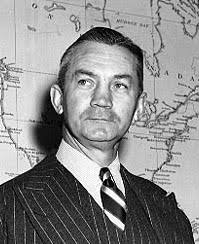 |
| Above: US Secretary of Defence and patriot, James V. Forrestal, a dangerous enemy to those who did, and still do, wield Psychiatry as a political weapon. |
(15)
In December, 1945, US Secretary of the Navy and soon-to-be US Secretary of Defence, James Forrestal, made the following entry in his diary about Joseph. P. Kennedy:
"Played golf today with Joe Kennedy. I asked him about his conversations with Roosevelt and Neville Chamberlain from 1938 on. Kennedy’s view: That Hitler would have fought Russia without any later conflict with England if it had not been for Bullitt’s urging on Roosevelt in the summer of 1939 that the Germans must be faced down about Poland [William C. Bullitt, an American Jew, was then the US Ambassador to France]; neither the French nor the British would have made Poland a cause of war if it had not been for the constant needling from Washington. Bullitt, he said, kept telling Roosevelt that the Germans wouldn’t fight, Kennedy that they would, and that they would overrun Europe. Chamberlain, he says, stated that America and the world Jews had forced England into the war."
And according to former US President Herbert Hoover (who heard it from Kennedy in May 1945), after Chamberlain had been pressured into giving guarantees to Poland at the beginning of 1939 he had confided in Kennedy that "he hoped the Americans and the Jews would now be satisfied, but that he felt that he had signed the doom of civilization."
(The reader may find the article "Poland as Pawn: Hoover Identifies Roosevelt’s Betrayal" instructive.*)
Forrestal, by the way, met his death under mysterious circumstances (to say the least), falling nine floors from a window of the psychiatric ward to which he had been involuntarily confined shortly after being forced to resign his post as Secretary of Defence by President Truman in 1949. He was almost certainly murdered, despite the verdict of suicide, just hours before he was due for release into a world in which he had no intention of keeping quiet about his detractors in the (fake) news media, and what he knew to be happening to America as a direct result of WW2 policy, particularly with respect to Bolshevism. In the period leading up to his incarceration, he had been subject to covert harassment and surveillance by Jewish elements in ways suggestive of a PsyOp. In fact the circumstances leading up to and culminating in his death are typical of the use of Psychiatry as a political weapon. Please understand: it is not merely that Psychiatry is inappropriately politicised for such purposes. Psychiatry is politics and nought else, besides a racket. Least of all is it Science. Click here for more.
 |
| General George S. Patton |
Forrestal's case (see above) is in some ways reminiscent of that of US General George S. Patton at the end of the war.
Like Forrestal, the straight-talking and immensely popular Patton was jumping at the proverbial bit to speak his mind freely to the American people about what was going on (in Europe) in their name. For this purpose he intended to resign his commission, freeing himself thus from a stiflingly political chain of command. And like Forrestal, Patton had been subjected to an unscrupulous smear campaign in the fake news media in the period leading up to his death in December 1945, a news media which Patton identified privately as "Semitic" in nature. On the 22 of September he wrote in his diary:
"There is a very apparent Semitic influence in the press. They are trying to do two things: first, implement communism, and second, see that all businessmen of German ancestry and non-Jewish antecedents are thrown out of their jobs .... They have utterly lost the Anglo-Saxon conception of justice and feel that a man can be kicked out because somebody else says he is a Nazi. They were evidently quite shocked when I told them I would kick nobody out without the successful proof of guilt before a court of law ...."
In a similar vein, Patton wrote to his wife in September about the farce passing for justice at Nuremberg. Borrowing a British expression he observed:
"I am frankly opposed to this war criminal stuff. It is not cricket and is Semitic."
His words were echoed a few years later by his British counterpart, Field Marshall Bernard Montgomery, who stated for the record:
"The Nuremberg Trials have made the waging of an unsuccessful war a crime."
Of course, like John Kennedy(16), Patton's objectivity about the Germans was unencumbered by present day propaganda narratives based on lies and hearsay. In another letter to his wife, he laments somewhat prophetically, and in terms borrowed not without significance from American revolutionary, Patrick Henry:
"If what we are doing to the Germans is 'Liberty', then 'give me death'. I can't see how Americans can sink so low. It is Semitic, and I am sure of it."
And in his diary, again prophetically, but perhaps a little further into the future than he anticipated:
"It is my belief that when the word 'de-nazification' has worn itself out and when people see it is merely a form of stimulating Bolshevism, there will be a flop of the pendulum in the opposite direction."
Indeed. In fact, both in his diary and in his private correspondence in the months leading up to his death, Patton repeatedly expressed the gravest concern about the Judeo-Bolshevik threat to traditional American values and to Liberty, a threat epitomised in his own country at that time by notorious double dealers like Harry Dexter White, Henry Morgenthau and Bernard Baruch, and facilitated by political opportunists like Dwight D. Eisenhower. Patton had wanted to protect Europe from the Red army and Ilya Ehrenberg's bestial hordes, but was not permitted to do so, thus setting the stage for the Cold War and associated losses in the decades to come. He was increasingly disgusted with what he was witnessing in Germany and Europe, and inclined to go public with what he knew. On the 1st of October he wrote in his diary:
"Everyone seems to be more interested in the effects which his actions will have on his political future than in carrying out the motto of the United States Military Academy, 'Duty, Honour, Country'."
And later that month in a letter to a military colleague:
"It is my present thought .... that when I finish this job .... I shall resign, not retire, because if I retire I will still have a gag in my mouth .... I should not start a limited counterattack, which would be contrary to my military theories, but should wait until I can start an all-out offensive ...."
Within weeks General George S. Patton was dead.
The orthodox historical narrative of General Patton's death would have us believe that he died in hospital while being treated for injuries sustained in a car accident; regrettable, yes, but no suggestion of foul play, despite the curious timing of the accident only a day before Patton was due to leave Germany permanently and return to America. Other doubts, however, have been raised about the official account besides the latter.
For example, Robert Wilcox makes a strong case in his 2008 book, "Target: Patton", that the US General was assassinated by a specially trained OSS agent (and Jew) called Douglas Bazata, with the cooperation of the Russian NKVD. (The OSS and the NKVD were precursors to the CIA and the KGB respectively.) Wilcox interviewed Bazata personally when the latter was in his eighties and had just suffered a stroke. In what appears to have been something of an end-of-life confessional, Bazata maintained that Patton's car accident in December 1945 was a set up, enabling him to fire a low velocity, bolt-like projectile from the side of the road into Patton's face, breaking his neck. Later at the hospital, Bazata believed that the NKVD finished the job, inducing a fatal "embolism" by the introduction of air bubbles into Patton's bloodstream with a syringe.

Click here for part one of a US radio interview with Wilcox about his book. Further parts can be found on the channel here.
Though Wilcox is careful not to point his finger too directly at the internationalists who make the co-operation of organizations as ostensibly disparate as the OSS and the NKVD possible, his investigation into a possible methodology for the killing of Patton, and the evidence of a cover up thereof, may make helpful reading for those wishing to push their way past propaganda firewalls to the truth about the Second World War.
*Note: CG cannot vouch for any unlinked content on external websites.
(16) In a diary that JFK kept in the months following the end of the Second World War, he predicted:
"Hitler will emerge from the hatred that surrounds him now as one of the most significant figures who ever lived .... He had boundless ambition for his country which rendered him a menace to the peace of the world, but he had a mystery about him in the way he lived and in the manner of his death that will live and grow after him .... He had in him the stuff of which legends are made."
Interestingly if one replaces "peace of the world" in the above statement with "international banking interests" then not only would Kennedy have been nearer to the mark regarding Hitler, but he would have been uncannily close to describing the legacy that many Americans believe Kennedy himself left behind almost two decades later, which is perhaps indicative of the nature of the American statesman's own inspiration. Not only that, his conclusion regarding the real cause of World War Two would have matched the one that Churchill had arrived at by 1960 when he confided to Lord Roger Boothby:
"Germany's unforgivable crime before the Second World War was her attempt to extricate her economic power from the world's trading system and to create her own exchange mechanism which would deny world finance its opportunity to profit."
JFK's conspicuous objectivity regarding Hitler and World War 2 (and Churchill's too in this case) are of course refreshingly unaffected by absurd propaganda narratives designed to be taken seriously only by the woefully ignorant and the deliberately misinformed.
Editor's note October 2020: There has been a concerted and suspiciously one-sided effort in Big Tech of late to call into question the authenticity of the above quote by Churchill, a polemic that serves to obscure the fact that the essential observation contained therein is undoubtedly true in any case; and that it is hardly likely that a man as well acquainted with the ways of the City as Churchill was, should have failed to perceive it.
Fact is, no government or nation in history has posed a greater threat to the power of international finance and banking (not to mention the secret society of Freemasons with which Churchill was also associated) than Hitler's Germany.
(By the way it would make an interesting study to find out just how many of the most influential proponents of present day coronavirus draconianism, not to mention high-ranking police officers, are Freemasons.)
Moreover the Hitler government completely removed disproportionate Jewish control of broadcast media, press and academia - a critical impediment to genuine national freedom and sovereignty even today – and put a Rothschild in jail into the bargain. (This was real action, not mere wordplay and diversion, which is all today's politicians are capable of, apparently, while the nations they purport to belong to go round and round in circles and ever deeper into slavery.) And the economic miracle that followed swiftly in 1930s Germany in the wake of such policies testifies generously to their wisdom, as does the unprecedented happiness, privileges and prosperity of ordinary German folk at the time.
Unfortunately it is not the ordinary folk who write the history books.
Nonetheless it is a matter of historical record, though now largely suppressed or downplayed in mainstream information sources, that the illustrious British statesman and World War One PM, David Lloyd George, told the Daily Express after his visit to Germany in 1936:
“I have now seen the famous German leader and also something of the great change he has effected. Whatever one may think of his methods – and they are certainly not those of a parliamentary country – there can be no doubt that he has achieved a marvellous transformation in the spirit of the people, in their attitude towards each other, and in their social and economic outlook.
“It is a happier Germany. I saw it everywhere, and Englishmen I met during my trip and who knew Germany well were very impressed with the change.
“I have never met a happier people than the Germans and Hitler is one of the greatest men.”
It was, however, a Germany that could not be permitted to continue unmolested by those who stood to lose most by the dangerous example it set to the rest of the world, including perhaps especially, the British people.
(17) Consider. Why would Churchill be so afraid for anyone of influence to even hear what the German peace offer is unless he knows how utterly unreasonable it would reveal him to be regarding it?
(18) The all so convenient (for certain parties) death of the kindly Neville Chamberlain (like that of US General George S. Patton a few years later), and the nature of it, has caused many a researcher over the years to raise an eyebrow or two. All we know for certain is that Chamberlain was experiencing, presumably, some kind of abdominal pain (in itself suggestive), and that he was operated on as a result and died shortly afterwards. The official cause has always been given as bowel cancer, but we are told that Chamberlain himself was not informed of the nature of his ailment as such. Why not? Were any family members informed? Was there an autopsy? Of course, doctor's reports can be faked especially when the stakes are so high. Could it be that the "cause of death" was concocted only after the fact, or when the chances of a second opinion sought by Chamberlain himself or his family were no longer in play?
(19) Churchill famously said of his drinking habits: “When I was younger I made it a rule never to take strong drink before lunch. It is now my rule never to do so before breakfast.” Apparently he wasn't joking.
(20) Shelley, I am told, did the voice not of Larry the Lamb (though he may have done the "baaa"), but of Larry's trusty friend Dennis the Dachshund.
(21) Attempts to debunk Irving's claims about Shelley's impersonation of Churchill for BBC broadcasts of three key WW2 speeches ("blood, toil, tears and sweat", "fight on the beaches", "finest hour") have included the contention that one of them, the famous "fight on the beaches" speech, was not in fact broadcast by the BBC at all on the evening of June 4th (the day Churchill delivered the speech to the House of Commons). According to these would-be debunkers, key portions from the speech were read by BBC announcers, not Churchill. The trouble with the claim is that the BBC website itself tells visitors that Churchill "spoke to the nation" on June 4th, as well as on June 18th, the date of his "finest hour" speech to Parliament. In the latter case the BBC even goes as far as citing audience reactions to the broadcast. Furthermore, advanced technology speech analysis of fifteen recordings ostensibly made by Churchill during the war has confirmed only twelve of them to be genuine, while the recordings of the aforementioned three speeches were revealed to be the performance of someone other than the British Prime Minister; someone who had gone to some lengths to sound like him, clearly. The question then remains, if the BBC did indeed broadcast these three speeches as delivered by Churchill, then where are the complete and authentic recordings? Curiously, moreover, Irving could find no contract between the BBC and Churchill in the archives for these three speeches, though the contract documents exist for other Churchill broadcasts.
(22) At least, they did after Churchill himself insisted on setting the hideous precedent.

